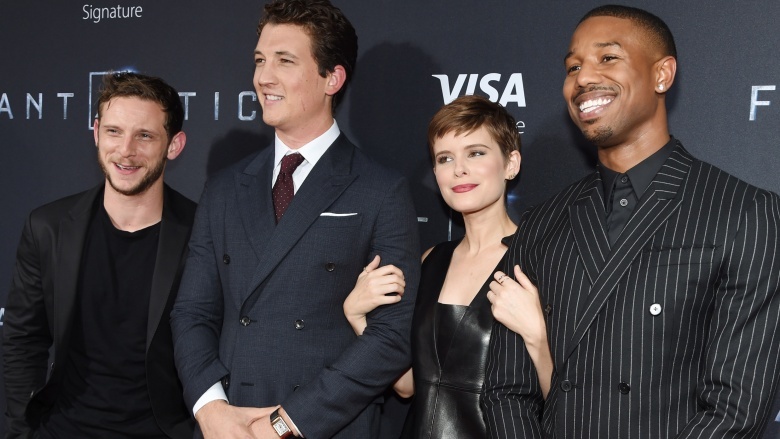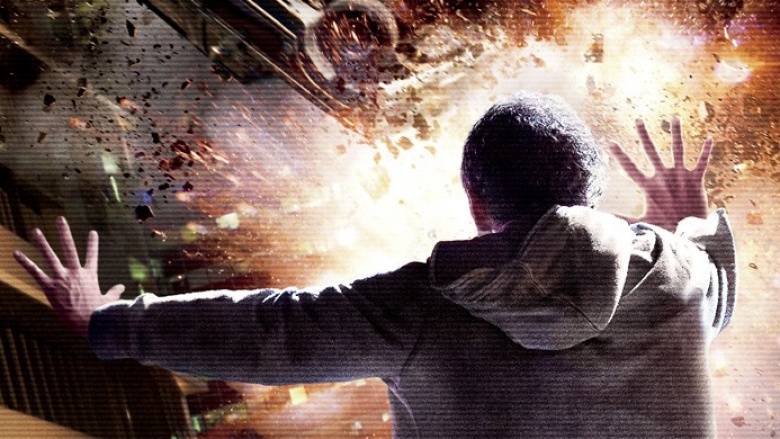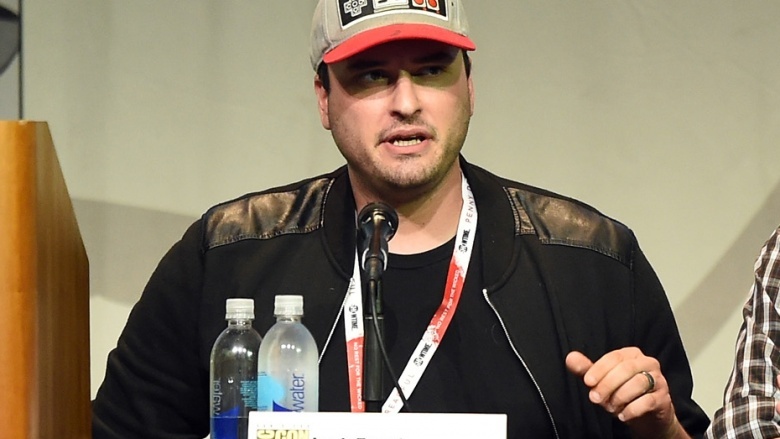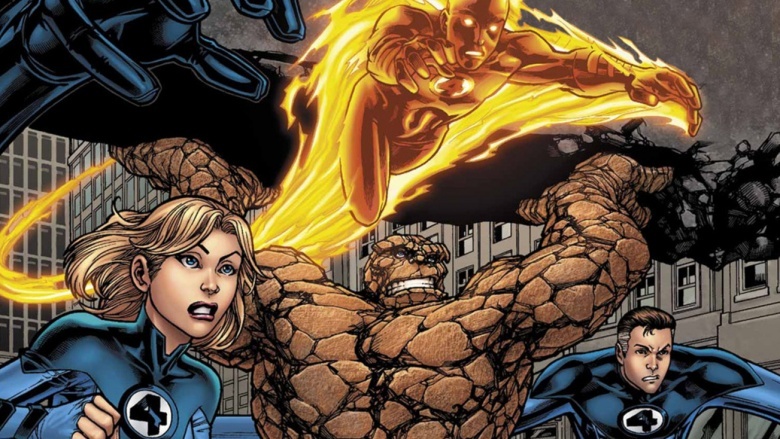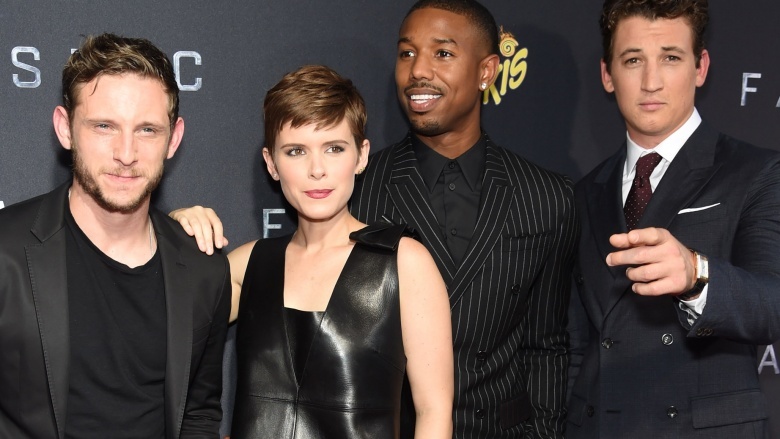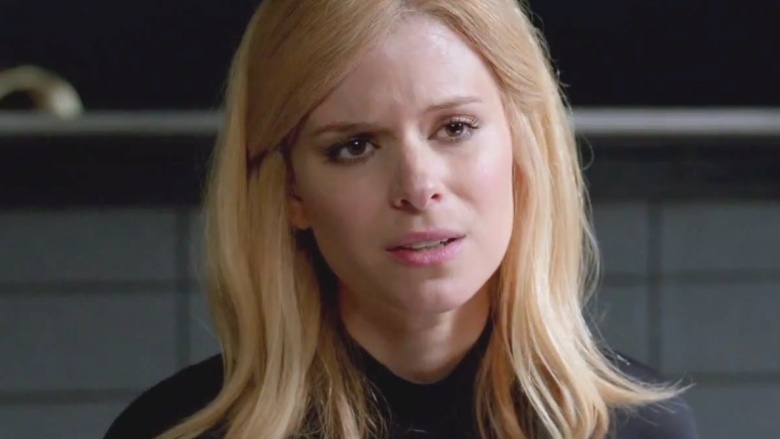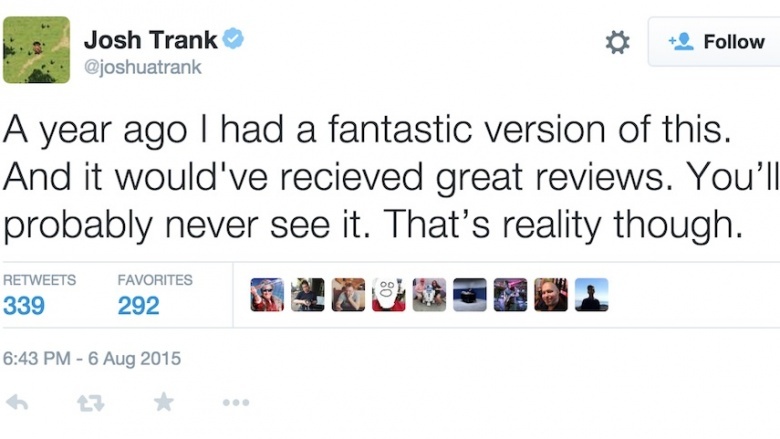Why The Making Of Fantastic Four Was A Total Mess
Every so often, a movie comes along that's so thoroughly hated that it achieves legendary status as a monumental bomb. It happened with Battlefield Earth, with Gigli, and it seems to have happened again with the 2015 reboot of Fantastic Four. While few people disagree that the final product is a mess of a movie, there are lots of theories as to just how it got that way. Here's what we've managed to piece together about what went wrong now that the dust has settled.
20th Century Fox Hired A Director With One Movie Credit
Josh Trank hit it big when he wrote and directed his first feature film, 2012's Chronicle, the "found-footage" story of teenagers who gain superpowers and how it all goes horribly wrong. The inexpensive movie was a critical and commercial hit, and Trank was hired by Chronicle's distributor, 20th Century Fox, to shape its reboot of Fantastic Four. While hiring a director with one movie credit to his name isn't a mistake in and of itself, it's definitely a risk when huge budgets and popular comic book licenses are concerned. As Fox discovered as time went on, the risk certainly didn't pay off.
Trank's Vision Was Wrong From The Start
According to The Hollywood Reporter, Fox supported Trank's vision for a "grounded, gritty version of Fantastic Four that was almost the opposite of previous versions." Even though Fox and Trank clearly had different takes on what the movie should be by the time production wrapped, it's important to point out that "grounded" and "gritty" are adjectives that should never have been used in association with the Fantastic Four in the first place. Lest we forget, the leader of the team is a guy who can stretch really far and drives a flying SUV called the Fantasticar. Sure, their comics have always been defined by the squabbles of family and the struggles to find acceptance in the world after becoming deformed weirdos. But in the end, the Fantastic Four has always worked best when the team cooperates to triumph over, say, cape-wearing dictators or super-beings who want to eat the planet. As bad as Fox's first two Fantastic Four movies are, they at least acknowledged the goofy fun that made the comics wonderful.
Marvel Probably Refused To Cooperate
As easy (and fun) as it is to point the to figure out who's to blame, it's important to remember that Marvel—the Disney-owned comic company that owns the original comic book license for the characters—almost certainly offered no assistance to Fox's production. Shortly before Fantastic Four hit theaters, Marvel canceled its long-running comic book of the same name. That's because, while it may seem counterintuitive, it's in Marvel's best interests if Fox's movie efforts starring its characters fail. Those failures could give Disney more leverage to buy back the film rights to each intellectual property, which were all sold off in the late-1990s when Marvel Comics was struggling and strapped for cash. Before Marvel Studios started breaking records with its Marvel Cinematic Universe, its comic creators often consulted on other studios' scripts and stories. These days, however, it's practically a sure bet that no one from Marvel was anywhere near the writer's room on 2015's Fantastic Four.
Trank Fought With The Studio, The Stars, And His Landlord
Early on, Trank battled Fox to have Miles Teller cast as the team's leader, Reed Richards. While the studio relented, it retaliated by forcing him to use Kate Mara as Reed's costar, Sue Storm. And despite pushing for Teller, Entertainment Weekly reports that the director and the movie's star nearly came to blows: "Things got so bad at one point, in fact, that Trank and Teller's disagreement brought them chest-to-chest, daring one another to throw the first punch." Meanwhile, more sources claim that Trank treated Mara poorly after Fox forced her into the production.
And that's not even all of it: reports have swirled about an ongoing dispute between Trank and the landlord of his New Orleans-house rental. Trank and his dogs allegedly caused over $100,000 worth of damage to the house—his temporary home during the shoot—and that attempts to evict Trank were met with yet more damage to the property and its contents. The landlord filed a complaint with the sheriff's department and then filed a civil suit against Trank. In all, it doesn't sound like the director made too many friends while shooting Fantastic Four.
Fox Ordered Last Minute Rewrites And Reshoots
Despite his troubles, Trank finished the movie—and whether or not it would've been a good Fantastic Four, there's ample evidence from the film that was released that it could've been a unique twist on the superhero formula. However, Fox wasn't interested in unique twists—it wanted a superhero tentpole that could support a multi-movie franchise and sell Fantastic Four-branded snacks and goodies at Denny's. The studio's answer was last-minute rewrites and reshoots. That meant using body doubles, a bad blonde wig for Kate Mara, and lots of green screen. The end result was a final act of a movie that made no sense and wasn't particularly fun to watch. The final act's badness made the Trank-directed earlier sections seem even more amazing than it probably was. No matter what Trank had delivered to Fox, chances are good it would've been better without the hastily added ending.
Tranktastic Tweet
In the run-up to the movie's release, rumors of the director's troubles with 20th Century Fox swirled all over the Internet. Trank, the actors, and the studio all attempted to spin a positive image during interviews with the press. But on the very day the movie was set to debut, Trank himself undid it all when he took to Twitter in a moment of brutal honesty: "A year ago I had a fantastic version of this. And it would've received great reviews. You'll probably never see it. That's reality though." He deleted the tweet quickly afterwards, but the damage had been done. Critics had already been publishing takedowns of the flick, but Trank's tweet seemed to confirm the movie's inherent crappiness to audiences who tend to ignore reviews. A week after the movie bombed with only $26 million in opening weekend revenue (compared to its estimated $120 million budget), The Wrap reported that Trank's tweet might have cost the movie at least another $5 million.
